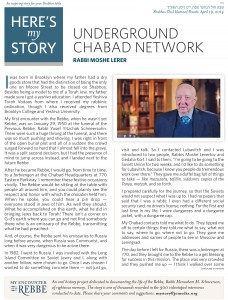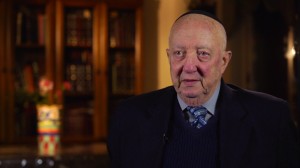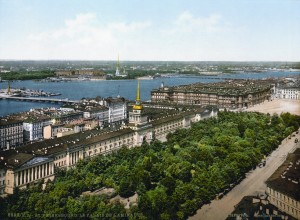Underground Chabad Network
I was born in Brooklyn where my father had a dry goods store. It had the distinction of being the only one on Moore Street to be closed on Shabbos. Besides being a model to me of a Torah Jew, my father made sure I received a yeshiva education. I graduated from night classes at Brooklyn College and I received rabbinic ordination from Yeshiva Torah Vodaas.
My first encounter with the Rebbe, when he wasn’t yet Rebbe, was on January 29, 1950 at the funeral of the Previous Rebbe, Rabbi Yosef Yitzchak Schneersohn. There were such a huge throngs at the funeral, and there was so much pushing and shoving. I was right in front of the open burial plot and all of a sudden the crowd moved forward so hard that I almost fell into the grave. It was a split second decision, but I had the presence of mind to jump across instead. I landed next to the future Rebbe.
After he became Rebbe, I would go, from time to time, to a farbrengen at the Chabad Headquarters at 770 Eastern Parkway. I remember these festive occasions vividly. The Rebbe would be sitting at the table with people all around him, and you could plainly see the respect and honor with which the chasidim held him. When he spoke, you could hear a pin drop – everyone stood in awe of him. As well they should. What he accomplished on this earth, what he did in bringing Jews back to Torah! There isn’t a corner on G-d’s earth where you can go and not find somebody there who is an emissary of the Rebbe, transmitting what he had preached.
And, of course, the Rebbe sent his emissaries to Russia long before anyone, when Russia was Communist, and when it was very dangerous to be active there.
In 1982, I went to Russia. I was involved with the Long Island Committee on Soviet Jewry and I, along with another fellow, were chosen to go. Once I was chosen I wanted to do something concrete there – not just go, visit and talk. So I contacted Lubavitch and I was introduced to two people, Rabbis Moshe Levertov and Gedalia Korf. I said to them, “I’m going to be going to the Soviet Union for two weeks, and I’d like to do something for Lubavitch, because I knew you people do tremendous work over there.” They gave me a duffel bag full of things to take – like mezuzahs, tefillin, siddurim, copies of the Tanya, matzah, and so forth.
I prepared carefully for the journey, so that the Soviets would not suspect what I was up to. I had no papers that said that I was a rabbi; I even had a different social security card; no driver’s license, nothing. For the first and last time in my life, I wore dungarees and a dungaree jacket, with a dungaree cap.
My Chabad contacts told me what to do. They tipped me off to certain things; they told me what to say, what not to say, where to go, where not to go. They gave me addresses and names of people to see in Moscow and Leningrad.
The day before I left for Russia, there was a farbrengen at 770, and they brought me to the Rebbe to a get blessing for success in this mission. The place was very crowded and they pushed me up – I think I walked over some heads and stood on somebody’s hat. But I got to the Rebbe and shook his hand, and he gave me a blessing for the journey – a blessing which saved my life, as it turned out.
In the Soviet Union, I was very closely watched – in my hotel room I found a microphone as big as a quarter hidden in the lamp. I had been warned not to talk in the room about anything important – just about the weather or sports, but not about politics, and not in Yiddish or Hebrew.
Among others I met with Mottel Lifshitz, Chabad’s underground kosher shochet, Kosher slaughterer, and a fellow by the name of Reb Getche, who was very active in Chabad’s underground network. When he found out that just before I arrived in Russia I was at a farbrengen with the Rebbe, he asked if I had brought some of the Rebbe’s vodka for them. But I hadn’t known to ask for it, so I had not. He was so very disappointed – if I had only thought to ask, it would have meant so much to these people to have something directly from the Rebbe to hold onto.
I also got a chance to meet with the tzaddik of Leningrad, Yitzchak Kogan, who was also very involved in Chabad’s underground activities. He asked me to officiate at a wedding, so I met with the bride and groom, and I learned that the groom didn’t have a tallis or tefillin. I told him it would be my privilege and my pleasure to give him my own personal tefillin as a wedding present. I needed it yet for the next morning prayers, but right after they would be his for the rest of his life.
But something happened, and he didn’t show up at the meeting place we had made up. I felt badly. Maybe I should have given him the tefillin the previous day – but I have never missed putting on tefillin in my life, so how could I?
As I got on the bus going back to the airport in Leningrad, I saw a man running. He had come for the tefillin. I gave it to him, and we spoke briefly in Hebrew. But the tourist guide heard us, and she informed against me.
As soon as I got to the airport, they stopped me. “What do you have in your suitcase?” they demanded. I had nothing, because I had given everything away. But they took me to an interrogation room anyway – bare walls, one naked light bulb. And they started in on me: “Who are you?” … “What are you doing here?” … “Where is your passport?”
It was very uncomfortable. I was saying the Vidui, the deathbed prayer, under my breath. I was thinking that they would send me to Siberia and nobody would ever know where I was.
But after about a half hour, they let me go. And I am absolutely sure – I know it in my bones through and through – that it was because of the Rebbe’s blessing. The Rebbe had said that I would succeed, that I would accomplish what I set out to do, and that I would return home safe and sound. And that’s what happened.
Since 1976, Rabbi Moshe Yitzchak Lerer has served as the chaplain of Pilgrim Psychiatric Hospital in Brentwood, NY. He is an active member of Hatzolah and the Rabbinical Council of Far Rockaway and the Five Towns. He was interviewed in Brooklyn, NY in January, 2014.








No Comments to “Underground Chabad Network”